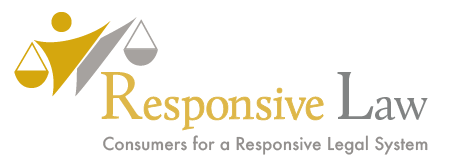Florida Supreme Court: "We'd Really Like To Help You, But We Just Can't. Only the Florida Supreme Court Can Help You."
10/15/2021
by Tom Gordon
Yesterday, the Florida Supreme Court ruled that TIKD, an app that helped people affordably fight traffic tickets, was engaged in the unauthorized practice of law. If you want to read legal arguments about why TIKD's service does not fall under UPL laws, you should read Responsive Law's amicus brief in the case, as well as the dissenting opinion to the court's decision. But the bigger issue here is not the legal standard for UPL; it's the system that continues to maintain those laws as a weapon against consumer choice, while claiming they are a shield to protect consumers.
Let's start with how this case came about. Once upon a time, a Florida law firm called The Ticket Clinic was an innovator in traffic ticket defense. The firm operated statewide, and advertised its services to the general public. Since most people didn't have the slightest idea of where to find a lawyer to fight their traffic ticket, this was a great benefit to consumers.
Then, a few years ago, TIKD came along. TIKD not only used the internet to connect people with lawyers, it analyzed traffic cases statewide to find out what the likelihood was of prevailing when fighting a particular ticket. It used this data to set prices so that a consumer could upload their ticket to TIKD's website and be quoted a fixed price for the lawyer who would fight the ticket and for TIKD to pay the ticket if it wasn't dismissed.
For example (using hypothetical numbers; I'm not privy to TIKD's pricing algorithm), if a ticket for $100 for speeding in a particular situation was likely to be dismissed 36% of the time, TIKD would charge the consumer $75. TIKD would set aside $64 towards paying tickets that were upheld. The lawyer in the case would get $10, and TIKD would get $1.
Lawyers finding clients through TIKD could be able to take multiple cases in the same court on the same day, and those $10 fees would quickly add up. They also wouldn't have to spend time marketing their services. And customers benefited from being able to pay a fixed price less than the amount of their ticket to resolve the matter, rather than having to shop for an attorney and run the risk of paying the ticket if it was upheld.
So who's unhappy with this situation? The Ticket Clinic. It had held a near monopoly over traffic ticket defense. Rather than adapting its business model to compete with TIKD, it decided to leverage its influence over the Florida Bar to try to force TIKD out of business.
After The Ticket Clinic brought a UPL complaint to the Florida Bar, the Florida Bar brought a UPL action against TIKD. UPL defense is expensive, and lawyers who had been offering their services through TIKD's platform feared that doing so might make them liable for UPL. So, long before the Florida Supreme Court handed down its decision, TIKD had stopped offering its services.
In its decision that TIKD was engaged in UPL, the court acknowleged that TIKD’s services could be considered a “good deal” for customers, and that no customers had alleged any harm as a result of TIKD’s services. In fact, the court said, “It could be argued, therefore, that TIKD in some ways increases affordable access to our justice system.” Still, the court said, its hands were tied by the regulations that define UPL.
Bill Clinton once said of George W. Bush's "compassionate conservatism" that it meant, "I'd like to do these things. But I just can't, and I feel terrible about it." Whatever one thinks about that claim in its original context, it certainly applies to the Florida Supreme Court here.
There's a further irony in this instance. The regulations governing UPL are made by none other than the Florida Supreme Court. So, in effect, the court is saying, "We can't help you; we're the Florida Supreme Court acting in its adjudicatory capacity. You need to see the Florida Supreme Court acting in its regulatory capacity."
But, when the court is acting in its regulatory capacity, the Florida Bar gets to play an official role. It appoints members to the committees that review any proposed changes to the court's rules. Those committees' recommendations are then sent to the Florida Bar Board of Governors for further review before finally being sent to the Florida Supreme Court. It took two years for the court to reach its decision about TIKD; this rulemaking process could easily take another two years. It would also have the monopolistic fingerprints of the Florida Bar all over it, almost certainly dooming it from the start.
There is another option though. A Florida Supreme Court committee recently issued a report that called for the creation of a "Law Practice Innovation Laboratory" in which the state could test some changes to the rules governing how legal services are provided. However, the proposed "Laboratory" would allow only minor changes to the rules, and wouldn't allow a business like TIKD to serve consumers. The court should replace the committee's weak recommendation, with its own decision to allow companies to provide regulated legal services to the public, regardless of whether the company is a traditional law firm owned entirely by lawyers.
The adjudicatory Florida Supreme Court has clearly stated that the public needs affordable legal help and that someone should change the rules that prevent them from getting it. The regulatory Florida Supreme Court needs to be that someone.
